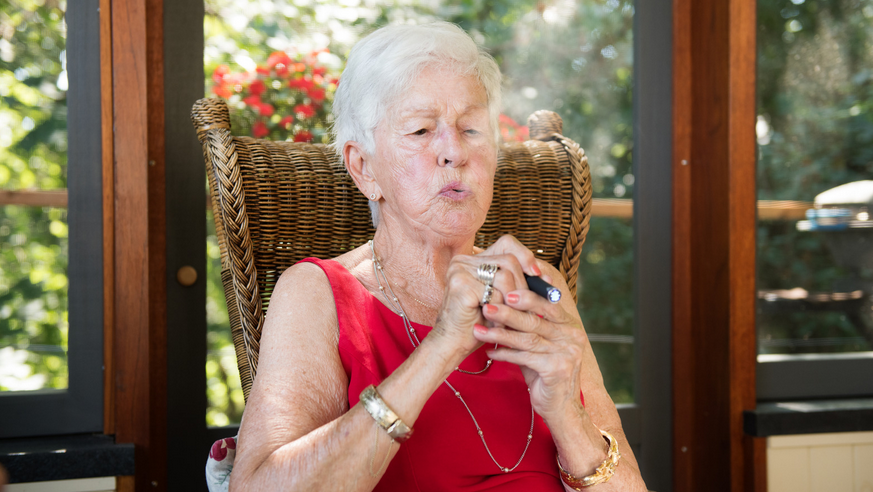Tips for Helping Your Elderly Loved One Quit Smoking

It can be hard to convince an elderly loved one to quit smoking. It’s a tough habit to break, and feelings of stress and anxiety often accompany it. But if you want your loved one to stay healthy, they need to quit.
Aside from the very real dangers of second-hand smoke, smoking is extremely bad for the health of your loved ones. This can be especially detrimental to those who are elderly. The negative effects smoking can have on the elderly are numerous, including heart disease and stroke. While quitting can be a struggle for many, some methods are more helpful than others. The following article discusses seven tips for helping your loved one quit smoking.
Understanding the Negative Effects of Smoking
The negative effects of smoking on the elderly are not that difficult to understand. Although the health risks of smoking are well known, many people continue to smoke. However, there are several other adverse effects too, including:
1. Decreased Brain Function – Smoking decreases brain function without use. It reduces cognitive development, which means the ability to think and reason well may be impaired. This can lead to difficulties in tasks like driving and using computers. Additionally, it may impair independence and self-control.
2. It Can Lead to Lung Cancer – Lung diseases such as lung cancer can develop after years of smoking. In smokers, lung cancer is more likely to develop than in non-smokers, and the earlier they start smoking, the higher their risk will be.
3. Gum Disease – Smoking can lead to gum disease, which can cause bleeding gums and, in some cases, tooth loss. It’s also more difficult to clean teeth when you don’t have gums to help fight bacteria and other mouth issues.
4. Heart Disease – Smoking can lead to heart disease, a severe problem for the elderly. As the risk of heart disease increases with age, older smokers have a higher chance of developing the disease.
5. High Blood Pressure – Smoking can increase blood pressure, leading to heart problems and strokes. It’s best to have your loved one check with their doctor about the effects of smoking on their blood pressure.
Tips for Helping Your Elderly Loved One Quit Smoking
Some people think giving gifts to overcome addiction would be an effective tool for helping someone quit smoking, but this isn’t always the case. The following tips for helping your loved one quit smoking can help them overcome their addictions and stay healthy for many years.
1. Remove the Smoking Triggers

In order to help your loved one quit smoking, you will need to remove all of the triggers that prompt them to light up. These triggers cause people to begin smoking again after they have tried and failed in the past. If you want them to quit, you will need to eliminate all of these.
Find out what triggers your loved one to smoke, and remove these from your home. If you live with them, you may need to go outside, so they do not feel tempted by your smoking habits.
In addition, look for other things to do with your loved
one when they are stressed, such as going for a walk or doing some yoga. Smoking will not help them destress. Find other ways to channel their energy into something more productive.
These are some factors that can trigger your loved one to smoke:
- Bad Mood – This is one of the biggest triggers for smoking. When your loved one is in a bad mood, they may turn to cigarettes as a way to relax. If you could help them get through their bad mood, they will likely quit smoking.
- Boredom – Smoking can be a way to pass the time when you are bored. If you can keep your loved one busy and engaged, they will have less of a reason to smoke.
- Stress – Some people use smoking as a way to relieve stress. If you can help your loved one destress, they will likely quit smoking.
- Depression – Smokers are especially prone to depression. If you can find ways to destress your loved one, then this may lead them to quit smoking.
2. Help Your Loved One Find a Substitute
If you want your loved one to quit smoking, you will need to help them find something else to do with their hands. If they can stay occupied with something else, they will not have a reason to smoke. When you are looking for a substitute, try to find something good for the health of your loved one. Try to find something that:
- Requires Movement – Your loved one will need to get up and move around if they start exercising. This can help them stay healthy.
- Is Easy to Learn – This will be easier if they are getting the activity from you, but if they are doing it on their own, try to find something that is both easy to learn and fun.
3. Develop a Good Support Circle

Look for support groups for your loved one to attend. You can also hire a companion for them to talk to. This is important if you want your loved one to quit smoking. The support of others will help them stay focused as they try to break the habit, offering a greater chance of success than working alone.
If you cannot find any support groups, consider looking online. There are plenty of places where you can see support from people who have been in your loved one’s shoes. You can read about the experiences of others and figure out what is the most helpful for them. You can set up your own support group for your loved one to attend.
4. Educate Your Loved One About Health
Show your loved one how smoking can change their health. For example, you can show them how cigarette chemicals can cause lung cancer or cause high blood pressure and harm the heart. You need to ensure they are aware of these effects if you want them to quit smoking.
You should also discuss the impact that smoking has on your health. If your loved one can see the effect smoking has on you and others, they may be more likely to stop for their health.
Refrain from criticizing your loved one for smoking, as this can cause them to feel bad about themselves and make it harder for them to quit. Instead, offer encouragement and advice about how smoking could lead to problems in the future if they continue. This can make your loved one consider leaving before any health problems set in.
5. Consider Nicotine Replacement Therapy

A great way to help your loved one quit smoking is to encourage them to use nicotine replacement therapy. This non-conventional approach involves using a patch slowly releases a drug into the bloodstream. This gradually changes the body’s chemistry to produce more dopamine, which is what smokers are addicted to.
Nicotine replacement therapy has proven extremely successful for many people trying to stop smoking. It can also help them ease into quitting since they will already be used to the feeling of being able to smoke. There are side effects, so you will need to carefully consider whether or not your loved one is willing to use it before you begin.
6. Practice Relaxation Techniques
Relaxation exercises can be beneficial when trying to quit smoking. This is because smokers become addicted to the relaxing feeling that comes from smoking when they are stressed. If your loved one knows how to relax, then they will have a natural way of dealing with stressful situations without needing cigarettes.
Some relaxation techniques that you can try include:
- Go for a walk – Walking for seniors is a great way to take your mind off stressful situations and allow time to rest.
- Do Some Yoga – There are a lot of different yoga techniques that can be used to destress. If your loved one is willing to try out some new ideas, they may find yoga quite relaxing.
- Take a Nap – This is a great way to destress and can be done anywhere.
- Deep Breathing Exercises – Using breathing exercises designed for solo individuals can help with the desire for cigarettes. This can be done anywhere and will help your loved one get their mind off the craving for cigarettes.
7. Surround Themselves With Smoke-Free People

If your loved one wants to stop smoking, they must surround themselves with people that do not smoke. This can put off the habit of smoking and will prevent them from going through withdrawal.
Talk to your loved one about this and find out if they would like a smoke-free guest. If they would like this, try to work out a schedule where they are not in the same room as their friends when they smoke. This can go a long way towards helping your loved one get rid of their smoking habit.
Final Thought
When you have tried all the methods you can think of, and your loved one has still not quit smoking, it could be time to talk to a professional. Everyone is different and may respond better to some methods than others. If you have been using these methods, which have not worked for your loved one, it may be time to seek professional help. You can find a therapist online or through a telephone consultation if you cannot find anyone else in your area that does this work.
At Serenity Senior Care, we provide care for seniors in their homes and communities. We take a holistic approach to aging, helping people maintain their independence as long as possible by addressing physical, emotional, and social needs. If you or someone you know is struggling with nicotine addiction, please contact us today to learn more about our services.


